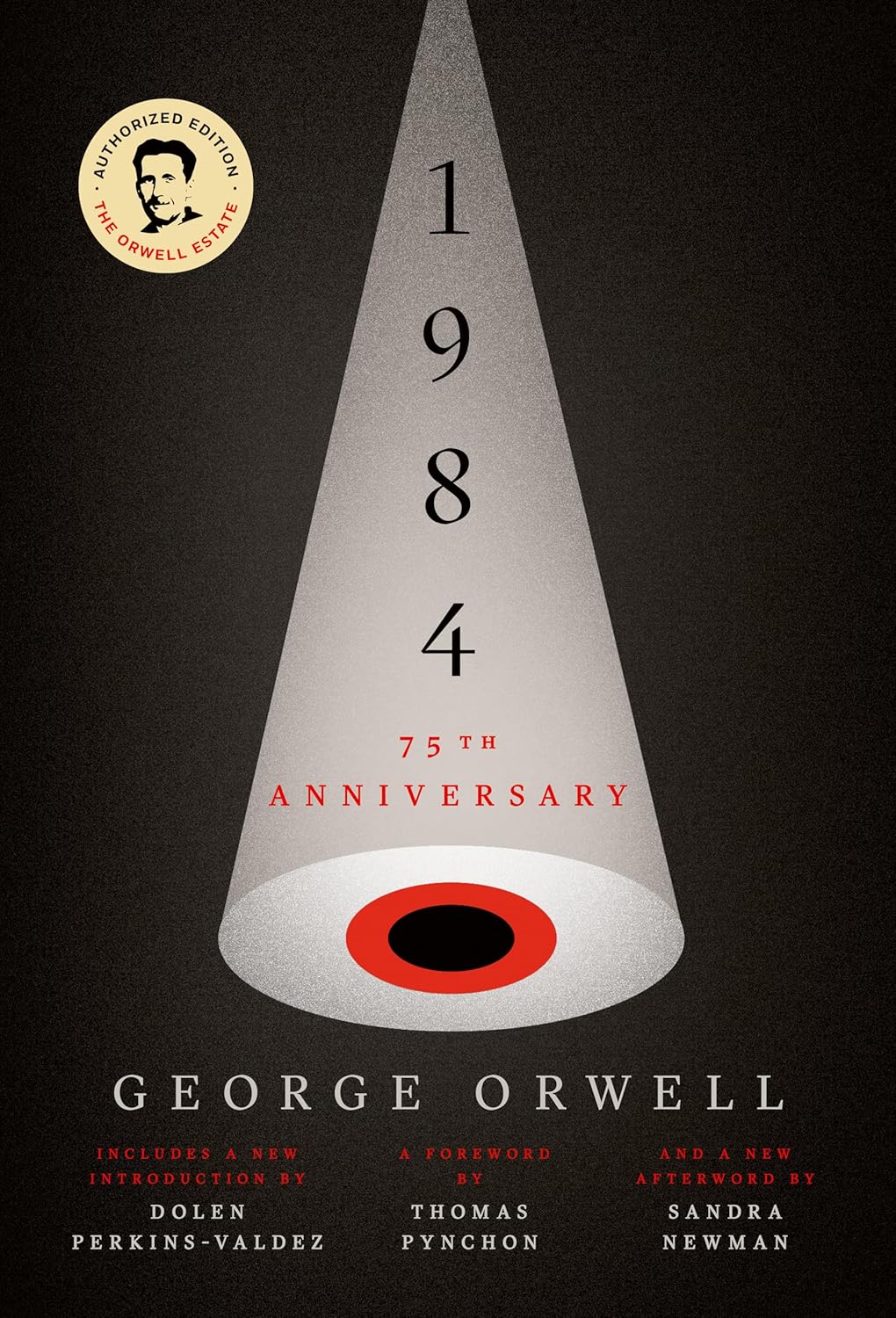
1984
1984 is a dystopian novel published in 1949 by British author George Orwell. Set in a totalitarian superstate called Oceania, the novel explores a world where every aspect of life is controlled by an oppressive government led by Big Brother. The regime uses constant surveillance, propaganda, and mind control to maintain power and eliminate individual freedom.
The story follows Winston Smith, a worker at the Ministry of Truth, whose job is to rewrite history to fit the Party’s current narrative. As Winston begins to question the regime and seek truth, he enters a forbidden love affair and joins what he believes to be a resistance movement—only to discover how deeply the Party controls not just actions, but thoughts.
Description
- George Orwell’s “1984” is a dystopian novel set in a totalitarian society ruled by the Party and its figurehead, Big Brother. The story follows Winston Smith, a government worker who secretly rebels against the regime’s oppression, surveillance, and manipulation of truth. The novel explores themes of individual freedom, conformity, and the dangers of absolute political control.
FAQs
- What is the central theme of George Orwell’s “1984”?
- • “1984” explores the dangers of totalitarianism, the pervasive surveillance state, and the manipulation of truth. It serves as a cautionary tale about the loss of individuality and freedom under a regime wielding absolute power.
- Who is the protagonist of the novel and what is his role?
- • The protagonist is Winston Smith, a minor member of the ruling Party who harbors skepticism about the oppressive methods used to maintain control in Oceania, the superstate depicted in the novel.
- Why is the year 1984 significant in the novel?
- • Orwell wrote “1984” in the 1940s, envisioning a dystopian future marked by global war and totalitarian control. The year 1984 represents a future point where these themes culminate in a society devoid of freedom and truth.
- What role does war play in the society described in “1984”?
- • Endless war is a tool used by the ruling class to maintain power by keeping the lower classes powerless and forcing continuous productivity, which prevents prosperity from undermining the Party’s control.
- How has “1984” remained relevant since its publication?
- • The novel remains popular and influential for its profound insights into authoritarianism and human rights, with themes that continue to resonate in discussions about government surveillance, propaganda, and personal freedom.
- Are there any notable elements or facts about “1984” that readers might not know?
- • Orwell’s experiences in the Spanish Civil War significantly influenced the novel’s themes. Additionally, Winston Smith is portrayed as a deeply flawed hero, which adds complexity to the narrative.
- Is “1984” suitable for book clubs and study groups?
- • Yes, numerous discussion guides and study questions are available to facilitate deeper exploration of the novel’s themes, characters, and societal implications, making it an excellent choice for book clubs and academic settings.
- How does “1984” compare to contemporary society?
- • Readers and scholars often analyze how Orwell’s vision in “1984” parallels modern concerns about privacy, government oversight, and media manipulation, prompting reflection on the accuracy and warnings embedded in the novel.
Quotes
- “Perhaps one did not want to be loved so much as to be understood.” — George Orwell, 1984
- “Who controls the past controls the future. Who controls the present controls the past.” — George Orwell, 1984
- “If you loved someone, you loved him, and when you had nothing else to give, you still gave him love.” — George Orwell, 1984
- “In the face of pain there are no heroes.” — George Orwell, 1984
- “If you want to keep a secret, you must also hide it from yourself.” — George Orwell, 1984
- “Every record has been destroyed or falsified, every book rewritten, every picture has been repainted, every statue and street building has been renamed, every date has been altered.” — George Orwell, 1984
- “War is peace. Freedom is slavery. Ignorance is strength.” — George Orwell, 1984
- “The best books… are those that tell you what you know already.” — George Orwell, 1984
- “All animals are equal, but some animals are more equal than others.” — George Orwell, 1984 (also from Animal Farm, often cited alongside 1984 to illustrate Orwell’s themes)
- “Man is the only creature that consumes without producing.” — George Orwell, 1984
- PART ONE: Chapter 1 2,310 Words
- PART ONE: Chapter 2 2,330 Words
- PART ONE: Chapter 3 2,198 Words
- PART ONE: Chapter 4 2,243 Words
- PART ONE: Chapter 5 2,072 Words
- PART ONE: Chapter 6 2,411 Words
- PART ONE: Chapter 7 2,488 Words
- PART ONE: Chapter 8 2,548 Words
- PART TWO: Chapter 1 2,241 Words
- PART TWO: Chapter 2 2,360 Words
- PART TWO: Chapter 3 2,431 Words
- PART TWO: Chapter 4 2,282 Words
- PART TWO: Chapter 5 1,917 Words
- PART TWO: Chapter 6 2,472 Words
- PART TWO: Chapter 7 2,244 Words
- PART TWO: Chapter 8 2,071 Words
- PART TWO: Chapter 9 2,471 Words
- PART THREE: Chapter 1 2,351 Words
- PART THREE: Chapter 2 2,587 Words
- PART THREE: Chapter 3 2,240 Words
- PART THREE: Chapter 4 2,389 Words
- PART THREE: Chapter 5 2,185 Words
- PART THREE: Chapter 6 2,431 Words
Quotes
“Perhaps one did not want to be loved so much as to be understood.”
— George Orwell, 1984
“Who controls the past controls the future. Who controls the present controls the past.”
— George Orwell, 1984
“If you loved someone, you loved him, and when you had nothing else to give, you still gave him love.”
— George Orwell, 1984
“In the face of pain there are no heroes.”
— George Orwell, 1984
“If you want to keep a secret, you must also hide it from yourself.”
— George Orwell, 1984
“Every record has been destroyed or falsified, every book rewritten, every picture has been repainted, every statue and street building has been renamed, every date has been altered.”
— George Orwell, 1984
“War is peace. Freedom is slavery. Ignorance is strength.”
— George Orwell, 1984
“The best books… are those that tell you what you know already.”
— George Orwell, 1984
“All animals are equal, but some animals are more equal than others.”
— George Orwell, 1984 (also from Animal Farm, often cited alongside 1984 to illustrate Orwell’s themes)
“Man is the only creature that consumes without producing.”
— George Orwell, 1984
FAQs
What is the central theme of George Orwell’s “1984”?
• “1984” explores the dangers of totalitarianism, the pervasive surveillance state, and the manipulation of truth. It serves as a cautionary tale about the loss of individuality and freedom under a regime wielding absolute power.
Who is the protagonist of the novel and what is his role?
• The protagonist is Winston Smith, a minor member of the ruling Party who harbors skepticism about the oppressive methods used to maintain control in Oceania, the superstate depicted in the novel.
Why is the year 1984 significant in the novel?
• Orwell wrote “1984” in the 1940s, envisioning a dystopian future marked by global war and totalitarian control. The year 1984 represents a future point where these themes culminate in a society devoid of freedom and truth.
What role does war play in the society described in “1984”?
• Endless war is a tool used by the ruling class to maintain power by keeping the lower classes powerless and forcing continuous productivity, which prevents prosperity from undermining the Party’s control.
How has “1984” remained relevant since its publication?
• The novel remains popular and influential for its profound insights into authoritarianism and human rights, with themes that continue to resonate in discussions about government surveillance, propaganda, and personal freedom.
Are there any notable elements or facts about “1984” that readers might not know?
• Orwell’s experiences in the Spanish Civil War significantly influenced the novel’s themes. Additionally, Winston Smith is portrayed as a deeply flawed hero, which adds complexity to the narrative.
Is “1984” suitable for book clubs and study groups?
• Yes, numerous discussion guides and study questions are available to facilitate deeper exploration of the novel’s themes, characters, and societal implications, making it an excellent choice for book clubs and academic settings.
How does “1984” compare to contemporary society?
• Readers and scholars often analyze how Orwell’s vision in “1984” parallels modern concerns about privacy, government oversight, and media manipulation, prompting reflection on the accuracy and warnings embedded in the novel.

